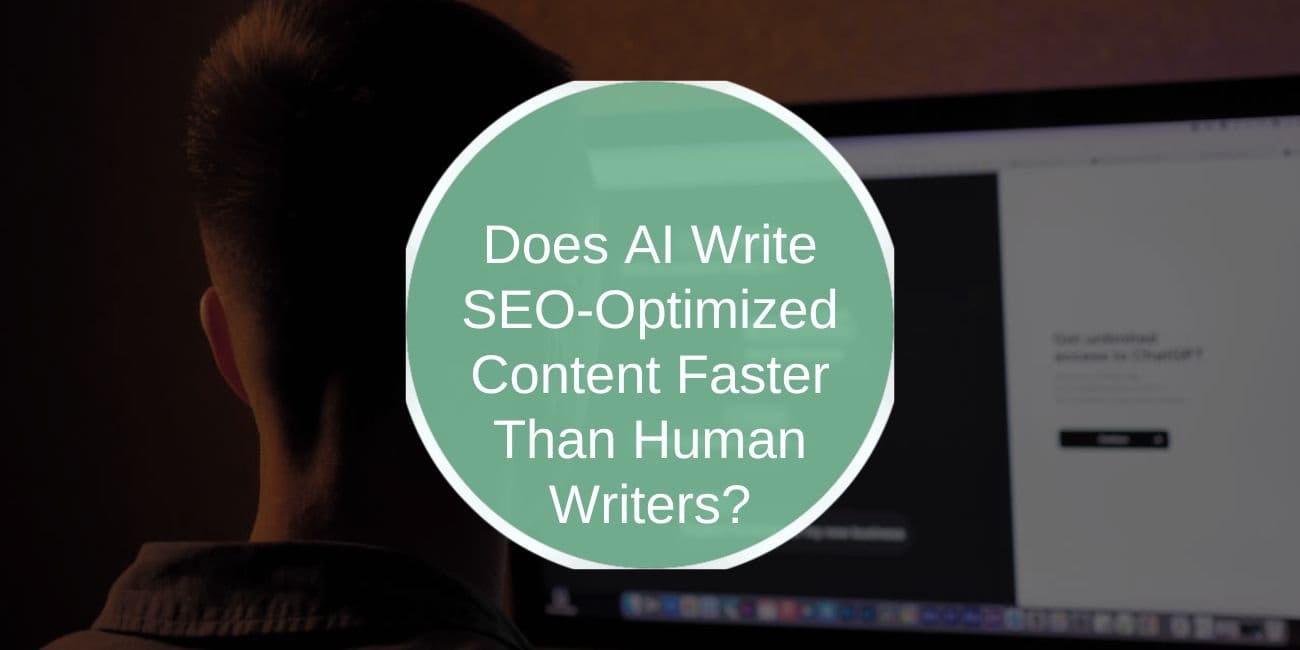The growing role of AI tools in content creation has transformed the way businesses approach SEO writing. Platforms like ChatGPT and Jasper promise rapid production of SEO-optimized content, often raising the question: Does AI outperform human writers in speed and quality? In this article, we explore the capabilities of AI, its advantages and limitations, and how it compares to human writers in crafting SEO content.
What makes AI faster than human writers in content creation?
One of AI’s standout features is its unparalleled speed. By analyzing vast datasets and understanding context through natural language processing (NLP), AI tools can generate complete articles, blogs, or product descriptions in minutes.
For instance, AI platforms like ChatGPT or Writesonic can produce a 1,000-word draft almost instantly, a task that might take a human writer several hours. This ability to create content on demand makes AI invaluable for businesses that need high-volume output under tight deadlines.
However, speed doesn’t always equate to quality. While AI drafts may be grammatically sound, they often require human review to ensure relevance, creativity, and adherence to brand voice.
SEO Optimization Capabilities
AI tools are designed to optimize content for SEO by analyzing keywords, semantic relationships, and user intent. Here’s how AI stands out:
- Keyword Integration: AI can seamlessly integrate target keywords into the content without overstuffing, maintaining readability and flow.
- Content Structuring: Tools like Jasper provide pre-built templates optimized for headings, subheadings, and meta descriptions, enhancing SEO performance.
- Data-Driven Insights: AI analyzes search trends and competitor content, ensuring the produced text aligns with current SEO best practices.
Despite these strengths, AI may fall short in strategic keyword placement or adapting to nuanced SEO trends, which often require a human touch.
Quality Comparison: AI vs. Human Writers

Here’s a closer look at how AI-generated content compares to human-crafted writing in quality and relevance:
Strengths of AI in Quality
- Consistency: AI ensures uniform grammar, spelling, and formatting.
- Efficiency: Quickly produces keyword-rich content for repetitive or data-heavy tasks.
- Data-Driven Insights: AI pulls trends and facts directly from its dataset for informed content.
Limitations of AI in Quality
- Contextual Understanding: AI struggles with nuances, tone, and cultural context, often producing generic content.
- Creativity and Emotion: It cannot replicate the emotional depth or storytelling finesse of human writers.
- Originality Risks: AI relies on existing data, which may inadvertently produce content resembling pre-existing material.
Where Human Writers Shine
Human writers excel in creating content that resonates with audiences. They can craft compelling narratives, adjust tone to match a brand’s identity, and infuse creativity into their work. These qualities make humans indispensable for high-stakes projects, such as brand campaigns or thought leadership articles.
The best results often come from combining AI with human expertise. AI can handle repetitive tasks, while humans focus on editing, strategy, and creative elements.
Read Also: Does Using AI Affect Website SEO? Myths and Facts Explained
Use Cases: When to Choose AI vs. Human Writers
Selecting between AI and human writers depends on the type of content and its purpose. Here are scenarios where each shines:
When to Use AI for SEO Content
- Product Descriptions: AI quickly generates concise, SEO-friendly descriptions for e-commerce platforms. It ensures consistency and saves time when dealing with large product inventories.
- Data-Heavy Content: For reports or blogs requiring factual accuracy, AI excels in processing and summarizing data. This makes it ideal for industries like technology or finance.
- Basic Pages: FAQs, landing pages, or instructional content can be created efficiently by AI, ensuring clear organization and SEO optimization.
- Localization Tasks: AI simplifies translating or adapting content for global audiences, making it scalable and efficient for diverse markets.
When to Opt for Human Writers
- Storytelling and Engagement: For blogs, feature articles, or case studies, human writers craft narratives that connect with readers emotionally, fostering trust and loyalty.
- Brand Voice and Identity: Humans ensure a consistent and authentic tone tailored to a brand’s personality, making content feel genuine and relatable.
- Complex or Technical Topics: In-depth subjects like medical or legal content demand human expertise to interpret and present ideas accurately and accessibly.
- Campaigns and Creative Content: For slogans, marketing campaigns, or ads, human writers bring the creativity needed to craft messages that resonate and inspire.
- Crisis Communication: Human writers provide the empathy and contextual understanding required for sensitive responses in PR crises or customer complaints.
Read Also: How to Use AI for On-Page SEO
FAQs About AI and SEO Content Creation
1. Can AI replace human writers for SEO content?
AI complements human writers but cannot fully replace them. It excels at efficiency but lacks the emotional and contextual understanding required for high-quality content.
2. How does AI handle semantic SEO?
AI tools analyze semantic relationships effectively, ensuring content aligns with user intent and search engine algorithms.
3. Are there ethical concerns about AI-generated content?
Yes, ethical concerns include transparency, potential biases, and originality. It’s essential to disclose AI involvement when applicable.
4. Is AI better suited for specific types of content?
AI works best for repetitive or data-driven content, while human writers are better for storytelling, branding, and complex topics.
5. What is the cost difference between AI tools and human writers?
AI tools often involve monthly subscription fees, making them cost-effective for high-volume needs. Human writers may cost more but provide higher customization and creativity.
Conclusion
AI tools like ChatGPT and Jasper have redefined the content creation process, delivering SEO-optimized content faster than human writers. While AI excels in speed and efficiency, human writers continue to lead in creativity, emotional depth, and strategic thinking.
For businesses, the best approach often lies in combining the strengths of both AI and human expertise. Whether you need quick turnaround for product descriptions or engaging blogs for brand storytelling, the right balance ensures optimal results.
What’s your take on AI’s role in SEO content creation? Share your thoughts in the comments below!

